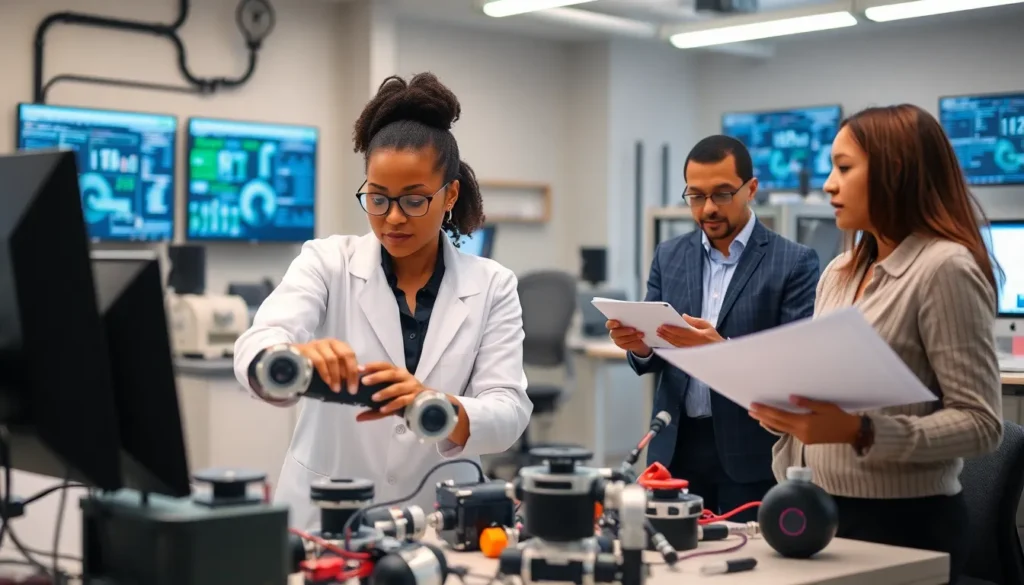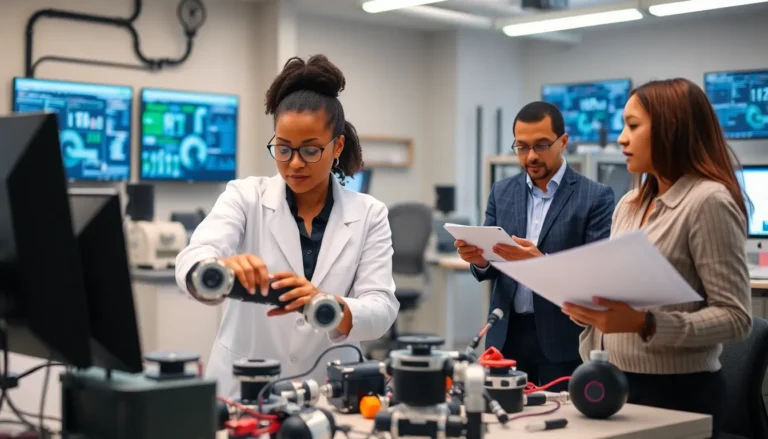In a world where robots are no longer just the stuff of sci-fi movies, careers in robotics are taking center stage. Imagine a job where you can design machines that might one day flip your burgers or even help with your laundry—talk about a dream come true! With technology advancing faster than you can say “artificial intelligence,” the demand for skilled professionals in this field is skyrocketing.
Table of Contents
ToggleOverview of Careers in Robotics
Careers in robotics encompass a broad spectrum of roles that cater to various interests and skills. Job titles like robotics engineer, software developer, and systems integrator play crucial roles in this field. Robotics engineers focus on designing and constructing robotic systems and often collaborate with multidisciplinary teams.
Software developers create the programming that enables robots to perform complex tasks. Mechanical engineers contribute to building the physical components of robots, ensuring proper functionality and durability. Electrical engineers design the circuitry that allows robots to operate efficiently, integrating sensors and actuators.
Data analysts inspect the data generated by robotic systems, optimizing performance and functionality. Research scientists innovate new technologies and applications for robotics, paving the way for future advancements. Technical writers document processes, ensuring proper usage and maintenance of robotic systems.
The demand for professionals in robotics intensifies as industries such as manufacturing, healthcare, and agriculture increasingly adopt automation. According to the Bureau of Labor Statistics, employment in robotics-related fields is projected to grow by 9% from 2020 to 2030. Workers skilled in robotics can expect competitive salaries, with median annual earnings around $100,000.
Preparing for a career in robotics typically requires a solid educational background in engineering, computer science, or related fields. Hands-on experience through internships or projects enhances employability. Networking with industry professionals and continuous learning through courses or certifications keep individuals at the forefront of this rapidly evolving field.
Types of Careers in Robotics

Careers in robotics encompass a variety of specialized roles. Each role contributes uniquely to the advancing field of robotics.
Engineering Roles
Engineering roles constitute a significant part of the robotics industry. Robotics engineers focus on designing and building robotic systems, integrating mechanical and electrical components. They often collaborate with software developers to ensure that robots operate smoothly. Mechanical engineers specialize in creating the physical structures of robots, while electrical engineers work on circuitry and power systems. Both roles require a deep understanding of principles in their respective fields. Engineers in robotics enjoy high demand, with a projected growth rate of 9% in related employment from 2020 to 2030.
Research Positions
Research positions in robotics concentrate on innovation and technological advancements. Research scientists explore new ideas that push the boundaries of what robots can achieve. They conduct experiments, analyze data, and present findings that help shape future robotics applications. These professionals often work in academic or corporate research settings, partnering with engineers to develop practical implementations. Opportunities in research require advanced degrees and a background in fields such as computer science or engineering. As industries increasingly adopt automation, the need for qualified researchers continues to rise, contributing to the overall growth of robotics careers.
Skills Required for Careers in Robotics
Careers in robotics demand a diverse set of skills. Technical skills and soft skills each play a vital role in ensuring successful careers in this advancing field.
Technical Skills
Robotics requires proficiency in programming languages such as Python and C++. Knowledge in machine learning enhances a candidate’s ability to develop intelligent robotic systems. Understanding electrical engineering principles helps in designing circuit boards and sensors, while mechanical design skills contribute to building efficient robotic structures. Familiarity with control systems enables engineers to ensure robots respond effectively to commands. Experience with simulation and modeling software is crucial for testing designs before implementation. Professionals should also grasp data analysis techniques to improve robotic systems based on performance metrics.
Soft Skills
Communication skills are essential for collaboration within multidisciplinary teams, as clear dialogue facilitates project success. Problem-solving abilities empower professionals to troubleshoot issues that arise during the design and implementation stages. Adaptability is crucial in a technology-driven field, enabling individuals to keep pace with rapid advancements. Time management skills ensure that projects meet deadlines while maintaining high-quality standards. A proactive mindset fosters continuous learning, allowing workers to stay ahead in a competitive landscape. Emotional intelligence contributes to effective team dynamics, enhancing overall project efficiency.
Education and Training Paths
Education and training form the foundation for careers in robotics. Individuals pursuing these careers benefit from structured educational routes and specialized skill development.
Degree Programs
Bachelor’s degrees in engineering, computer science, or robotics serve as the starting point for many professionals. Universities offer master’s programs that delve deeper into robotics and automation topics. Some institutions even provide dedicated robotics degrees. Various schools emphasize hands-on experience through labs and collaborative projects. Pursuing a PhD is an option for those interested in research and advanced innovations. Graduates with relevant degrees find increased opportunities in the workforce.
Certifications and Workshops
Certifications enhance expertise in specific areas of robotics. Options include programs like Certified Robotics Technician or Certified Automation Professional. Workshops focus on emerging technologies such as artificial intelligence, machine learning, and programming languages. Many organizations offer online courses and webinars for flexible learning. Getting involved in robotics competitions also provides practical experience. Professionals benefit from staying connected through industry events and networking opportunities to showcase their skills.
Future Trends in Robotics Careers
The field of robotics continually evolves, driven by technological advancements and industry demands. Automating complex processes has become essential in sectors like manufacturing, healthcare, and agriculture, creating numerous opportunities for robotics professionals. By 2030, employment in robotics-related roles is projected to grow by 9%, highlighting the increasing reliance on robotics across various industries.
Emerging technologies, such as artificial intelligence and machine learning, significantly influence career trajectories in robotics. These innovations require professionals to adapt, learning new programming languages, data analysis techniques, and integration methods. Collaboration among multidisciplinary teams remains vital, as diverse skills are crucial for developing advanced robotic systems.
Career paths are diversifying, with increased emphasis on specialized roles such as robotics software developers, data analysts, and systems integrators. Robotics engineers continue to play a key role in building physical robots, while software developers focus on programming algorithms that enhance robotic functionality. Data analysts ensure optimal performance by interpreting system-generated information, making their roles increasingly valuable.
Education and training are adapting to meet current demands as well. Pursuing degrees in engineering or computer science provides foundational knowledge, while certifications in specific robotics areas enhance employability. Continuous learning through online courses, workshops, and industry events is essential for professionals who wish to stay ahead.
The future of robotics careers holds significant promise. As automation integrates deeper into everyday life, skilled professionals will play a crucial role in shaping this dynamic field. Keeping pace with technological advancements and acquiring relevant skills will position individuals for success in the evolving landscape of robotics.
Careers in robotics are not just a trend; they’re a vital component of the future workforce. As technology progresses, the demand for skilled professionals continues to rise across various industries. Those pursuing a career in robotics can expect to engage in exciting projects that push the boundaries of innovation.
With a diverse range of roles available, from engineering to research, individuals can find their niche in this dynamic field. Continuous learning and adaptability are essential for staying relevant as new technologies emerge. The future holds immense potential for those ready to embrace the challenges and opportunities in robotics, making it an enticing career path for aspiring professionals.





